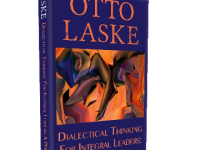This article introduces to the Constructive Developmental Framework (CDF), addressing those readers who want to learn to use the methodology. CDF is seen as a comprehensive framework for consulting and coaching, much like NLP, but on a higher level of consciousness. Its main intellectual strength lies in establishing a methodology for the deconstruction, through dialog, of less developed thinking and meaning making, for the sake of client benefit. Viewed more broadly, CDF is a framework for “coaching for society” that can lift individuals’ and teams’ developmental level. What is CDF -- An Introduction for Beginners Read More...
Category: Articles by Otto Laske
DIALECTIC IS GOOD FOR BUSINESS: IT HELPS TO BEFRIEND IT
It so happens that not only is the world in unceasing transformation, but the human mind (which is part of it) has been given invaluable tools to deal with it. I am referring to the “four moments of dialectic” philosopher Roy Bhaskar taught us, as well as to Basseches' and my own work on dialectical thought forms since the year 1997. In courses at the Interdevelopmental Institute, I have shown since 2000 that the four moments of dialectic equally show up in human thinking, whether manifest in speaking or writing. I daresay this could be a key for living in this rapidly changing world a little more prepared what is coming toward us. How could you make a start in dialectic? Well, as philosophers have always taught us, you need to start with yourself. It isn’t hard, but it takes an effort. Living in a language-suffused world as we do, you could start with what you hear yourself saying when you speak and consider how the four moments of dialectic inform your thinking that is being expressed through concepts. You will find that as soon as you open your mouth you have already placed yourself into one of the four... Read More...
Dialectical Thinking as a Culture Transformation Instrument for Organizations.
In this new book (to appear in 2016), addressed to CEO's, board members, and members of executive teams, Otto Laske takes an in-depth look at his Constructive Developmental Framework as a culture transformation instrument. The book focuses on organizational discourse culture as the lever by which fundamental changes come about when engaging with new forms of one-on-one and peer-listening once these are grounded in systemic dialectical thinking and an ability to "read" social-emotional meaning making in company discourse. In the tradition of consulting work based on CDF, culture transformation effects transpire in all areas of crucial important for company flourishing and breakthroughs: level of innovation, strategy design, talent management, peer-to-peer interactions in groups and teams, and the definition of new business models. The book delivers insight into the human operating system supporting holocracy. While "active listening" has been much emphasized in coaching, hosting, and DoJo4Life work, structured listening in terms of CDF is not only active but DEEP. It is deep because it is focused on joining two aspects implicit in every communication: the level of speakers' social-emotional meaning making, and the level of making cognitive sense of the world and handling its complexity. As shown in the book, both... Read More...
What Coaches Should Know About Their Clients
This text highlights the main benefits of integrating research in adult development into executive coaching practice. Reading the text from a coaching point of view will be a first step to the practice of developmental coaching, with a focus on working withhigher level executives. The text refers to CDF, the Constructive Development Framework. Introduction to Developmental Coaching for Executives Read More...
Short Characterization of the CDF-Based Coaching Methodology
This short article describes what makes CDF-based coaching unique and makes it different from other coaching approaches. The CDF-based coach training method enriches approaches based on theories of adult learning by insights and practices derived from theories of adult development over the lifespan (1975-1995). CDF further enriches theories of adult development by insights derived from Critical Theory elaborated at the Frankfurt School between 1945 and 1975. Researchers of adult learning and development have only just begun to talk to each other, so that a synthesis of the two lies in the more or less distant future. The main result of including in coaching techniques of Critical Theory (Adorno) is that the emphasis of CDF-training is on the coach, not the client, in particular the coach as a “critical, deep thinker” who can guide the client’s adult development, fully aware of the client’s present developmental profile. Learning and development are seen in CDF as entirely different. “Learning” is accumulation of knowledge and experience over time (measured by horizontal snapshots at a particular time point), while “development” is a discontinuous deepening of meaning making and thinking across individuals’ entire lifespan (measured longitudinally, across time, through structured interview). Whereas adult learning approaches are... Read More...
How Do You Teach Your Client to Think Developmentally?
The article is based on a dialog between a mentor and a behavioral coach who desires to learn to think developmentally. After an introduction on coaching focused on clients’ Frame of Reference, the four individual dialogs deal with the three aspects of human capability, the nature of developmental scores, the nature of behavioral “need-press” scores, and the synthesis of CDF data for use in coaching practice. Laske 2007 Mentoring a Behavioral Coach to Think Developmentally Read More...
